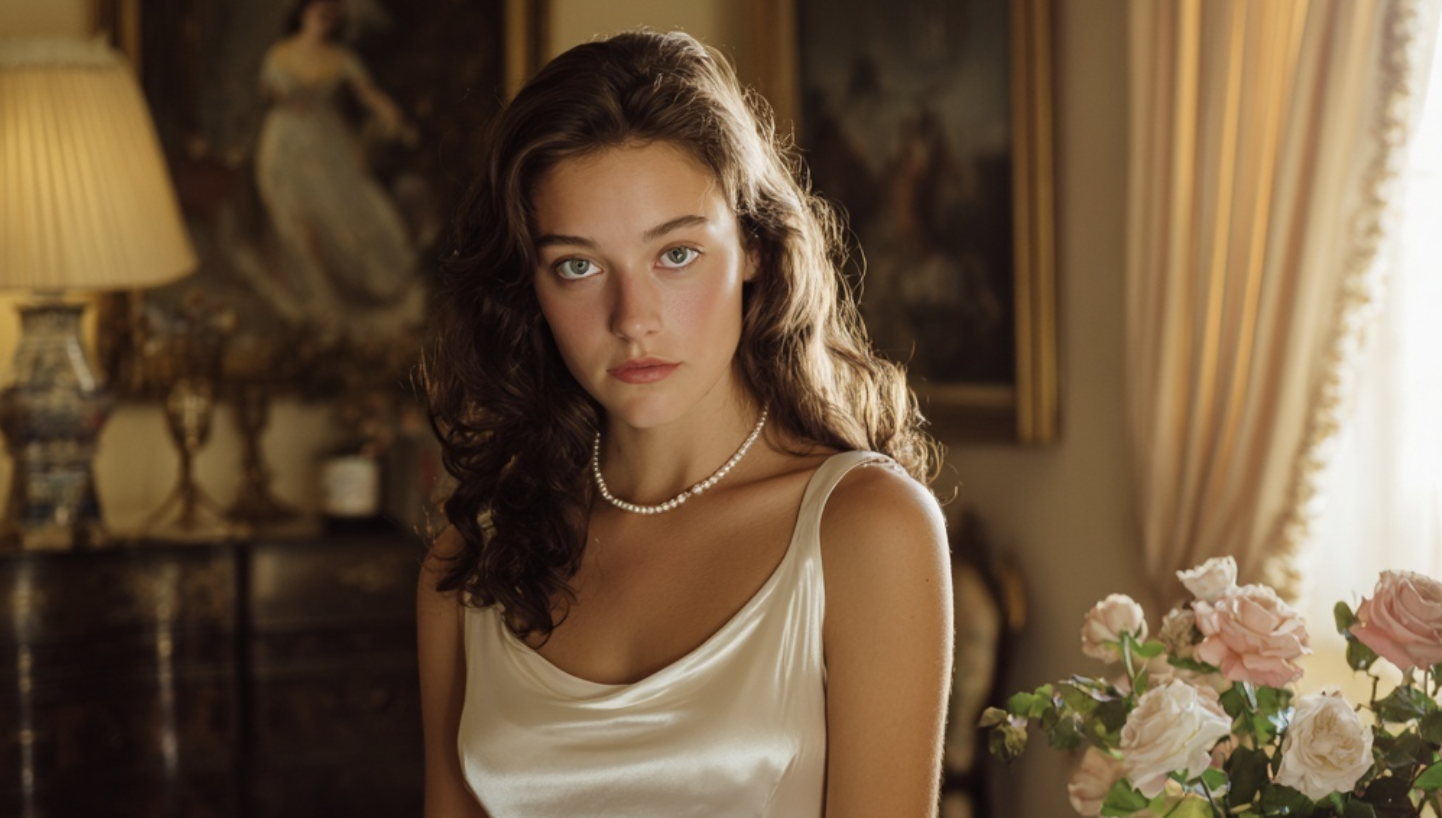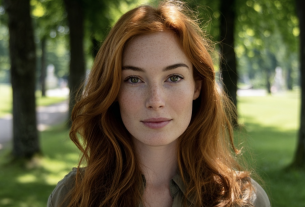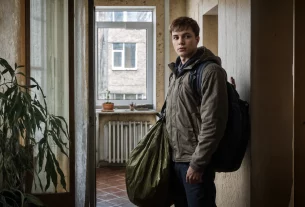Vadim didn’t come into the apartment alone. Behind his broad back, as if hiding and peeking out at the same time, stood a young girl.
Her hand clenched the strap of an unnaturally bright bag, and her eyes drank in the details of our entryway with greedy curiosity — the massive mirror in an oak frame, the onyx key holder, my watercolor on the wall.
“Katya, meet…” my husband’s voice was even, almost businesslike, as if he were introducing me to a new employee or a distant relative who’d come to apply to a university. “This is Veronika.”
I slowly tore my gaze from his face, which showed not a trace of embarrassment, and looked at her. Pretty, yes.
Young, with a fresh blush and that spark of defiance in her eyes that people have when they’re certain of their own irresistibility.
“She’s going to live with us now,” Vadim went on, casually kicking off his shoes. “I’ve thought about it for a long time and decided this will be simpler and, you know, even more honest for everyone. We’ll live as three.”
He waited for an explosion. He anticipated it. Tears, shouting, accusations, smashed dishes — the whole arsenal he so despised in other women and had vainly expected from me for all ten years of our marriage. He didn’t get it this time either.
I smiled. A calm, light, almost social smile, and for the first time in this conversation the corner of Vadim’s mouth twitched. He’d expected anything but that.
“All right,” I said simply.
He froze mid-sentence. The girl’s eyebrows shot up in surprise; her confidence faltered for a moment.
“Only I have one condition,” I shifted my gaze to Veronika, completely ignoring my husband, who suddenly became an unnecessary detail in the interior. “And it concerns only you. Let’s go to the kitchen and discuss it over tea.”
I turned and went first, feeling the bewildered silence hanging in the hallway behind me. A second later I heard uncertain footsteps following.
In the kitchen I put the kettle on and sat at the table, gesturing for Veronika to take the chair opposite. She sat down cautiously, clutching her screaming-pink bag to herself like a life buoy.
“So, Veronika,” I began, looking her straight in the eyes. “Do you really want to live here? In this home, with this man?”
She nodded nervously, pressing her lips together.
“Excellent. I have no objection. You can use everything you see. But in return, you take on all of my duties in this house.”
Veronika frowned in confusion; her pretty little face showed puzzlement.
“Absolutely all of them,” I repeated, enunciating each word. “You’ll get up at six in the morning to make him a three-course breakfast, because he doesn’t eat porridge.
“You’ll make sure his shirts are ironed perfectly, without a single crease. You’ll make shopping lists, pay the utility bills, book his dentist appointments, and remember his mother’s birthday.
“All the things I’ve done for the past ten years. And I”—I paused for effect—“I will simply rest.”
She glanced around at the impeccable cleanliness of the kitchen, the expensive Italian appliances, the view of the park from the huge window.
A glint of excitement flashed in her eyes. She saw only the pretty wrapper, with no idea of the daily labor behind all that gloss.
“I… I agree,” she exhaled, clearly picturing herself as the full-fledged mistress of this little paradise.
“Then we have a deal,” I smiled again. “Welcome to the family, Veronika.”
The first act of this theater of the absurd began that very evening. I settled into the living room with a book I hadn’t managed to finish for half a year. For the first time in a long while, I didn’t listen for the timer on the oven.
From the kitchen came the sounds of vigorous but chaotic activity. The clatter of dishes, sizzling, and the sharp smell of burning oil that slowly but surely seeped into the living room, pushing out the usual delicate sandalwood scent from my incense sticks.
Vadim walked into the living room, wrinkling his nose in displeasure. He looked at me, then at the closed kitchen door.
“Couldn’t you help her?” he asked in a tone that brooked no argument. “She doesn’t seem to be managing. She’s already burned two frying pans.”
“That’s out of the question,” I replied without lifting my eyes from the page. “Veronika and I have a verbal agreement. And you, dear, were its silent witness and guarantor. You wanted honesty. Here it is.”
He started to protest, but Veronika appeared in the doorway, flushed and disheveled.
“Dinner is ready!”
Calling it dinner would’ve been generous. Chicken burned on the outside and raw inside sat next to slimy overcooked pasta. Vadim poked at his plate with disgust and pushed it away.
“Thanks, I’m not hungry,” he tossed, getting up from the table.
Veronika pouted in offense. I calmly ate the salad I had sensibly prepared for myself earlier that day.
The following weeks turned into a slow, methodical collapse of Vadim’s familiar, comfortable world.
His perfectly ironed shirts began appearing in the closet wrinkled, because Veronika didn’t know how to use the steamer.
The morning coffee was either too bitter or too weak. The house filled with a new smell — Veronika’s cloyingly sweet perfume mixing with the aromas of her failed culinary experiments. That thick, intrusive scent followed Vadim everywhere.
One evening he snapped. I was sitting on the balcony with my laptop when he came up to me. Veronika was loudly discussing the latest gossip with a friend on the phone in the bedroom.
“Katya, this is unbearable,” he began, lowering his voice to a hiss. “I come home and it’s a mess. The food is disgusting. She can’t do anything! She doesn’t even know how to book us a table at the Metropol!”
“You chose her,” I observed calmly, not looking up from the screen. “You brought her into this home. You said this is how we would live.”
“That’s not what I meant!” he raised his voice. “I thought you would… be like before. And she… you know, for the soul.”
“For the soul you have to create the right conditions,” I countered, snapping my laptop shut. “You destroyed the old ones and failed to build new ones. Veronika is doing her part of the deal as best she can.”
“What deal, for God’s sake?!” he exploded. “This is my house! I want it clean here and smelling like decent food!”
“Then talk to the mistress of the house,” I nodded toward the bedroom, where shrill laughter drifted out. “The one who’s now responsible for cleanliness and food. My powers, as you recall, have expired.”
I stood and left the room, leaving him alone on the balcony. He watched me go with a look as if he was seeing the real me for the first time. And he categorically didn’t like this new image.
The point of no return was my study. A small room I had fought for many years ago.
There stood my old drafting table, and on the shelves were folders with sketches and projects — everything that remained of my life before Vadim, of my career as an architect.
It was my sanctuary, the place where I was still myself.
I walked in on a Saturday morning and froze. On the floor stood an open box with Veronika’s things, and on my table, right on top of a spread-out design for a country house I had once drawn for my parents, was an ugly blot of bright pink nail polish.
Several folders with my best work had been shoved aside carelessly, and sketches had spilled out of one.
“Oh,” came Veronika’s voice behind me. “I just wanted to make space for my things. And there’s so much old paper here. Vadim said you don’t need it anymore.”
She said it simply, without malice. Like a child breaking something intricate without understanding its value.
I stayed silent. I looked at the pink stain spreading across the drafting paper, soaking into lines and calculations. In that moment I felt nothing. No anger, no hurt. Only a deafening emptiness, at the bottom of which something cold and hard was forming, like steel.
Vadim came in. He saw my face, looked at the table.
“Katya, come on now,” he began in his usual conciliatory tone. “Veronika didn’t do it on purpose. They’re just old drawings; you haven’t touched them in a hundred years.”
And that was the last straw. Not the pink polish. His words. That light, careless belittling of what was my essence, my passion, my life. He hadn’t just allowed another woman to intrude into my home. He’d allowed her to desecrate my soul.
The smile that had irritated him so much these past weeks vanished. I slowly turned to him.
“These aren’t just drawings, Vadim. They’re the only thing I have left of who I used to be. And you knew that.”
“Oh, stop it, Katya…”
“Now to business,” my voice was calm, but there wasn’t a drop of warmth in that calm.
“This apartment was bought during the marriage, but the down payment — seventy percent of its cost — was made with money I inherited from my parents. I have all the documents.”
The self-assurance on his face gave way to bewilderment. He had always handled our finances, but I hadn’t let him into these matters.
“What are you talking about?”
“I’m talking about your visit having dragged on too long. I’m filing for divorce and for division of property. And the court, I assure you, will take the origin of the money into account. So I’m giving you a week to find a new place and move out.”
Veronika gasped, covering her mouth with her hand. Vadim stared at me, not believing his ears.
“You can’t!” he blurted out. “This is my home too!”
“Soon it won’t be,” I corrected. “And this”—I swept my gaze around the room—“is my territory. Your time on it has expired. The door is right there.”
Over the next few days, Vadim tried his entire arsenal of manipulations. There were threats, attempts to make me feel guilty, and memories of “our best years.” But he was appealing to a ghost. The Katya who feared conflict no longer existed.
Veronika, realizing the fairy tale was over and she had been nothing but a pawn in someone else’s game, quickly wilted. She silently packed her things, throwing Vadim angry, disappointed looks. She had lost, never understanding that true value belongs not only to things but also to people.
On the last evening he made a final attempt.
“Fine. She’ll leave,” he said when Veronika went to the store. “I understand everything now. I was wrong. Let’s start over. Just you and me.”
“Start over, Vadim?” I let out a bitter laugh. “‘Start over’ was when you respected my work. ‘Start over’ was when my study was mine. You yourself burned every bridge that led back to that ‘start.’”
He realized he’d lost. Completely and irrevocably. Their departure was pitiful and frantic.
When the door closed behind them, I walked through the apartment. I opened all the windows, letting in the fresh autumn air.
Then I went back to my study, took solvent, and carefully began removing the ugly pink stain from the drawing. It came off slowly, leaving a pale, barely visible trace on the paper, like a scar.
I took a freshly sharpened pencil and drew a new, confident line. A completely different one.
Two months later
A phone call caught me at work. I was standing at the drafting table, which now occupied the center of the study.
Creative disorder reigned around me: sketches, material samples, models. The smell of freshly brewed coffee mixed with the scent of paper and wood.
It was Oleg, a mutual acquaintance of mine and Vadim’s.
“Katya, I just ran into Vadim by chance… He asked me to tell you that… well, he’s sorry.”
I kept silent, letting him finish.
“He and that… Veronika… it didn’t work out. They split up after three weeks. She thought he’d settle her in a golden palace, but he rented a studio on the outskirts. The fights started, reproaches… Turned out that without your support his business isn’t all that stable. And she’s not the kind to put up with hardship.”
“Makes sense,” I said calmly.
“He’s alone now. Looks, honestly, not great. I think he realizes what he lost. He asked if he has any chance at all.”
I looked at the large sheet of drafting paper in front of me. On it, a design for an eco-hotel in the mountains was coming to life — bold, modern, full of light and air.
The very project that began with one new line drawn over an old scar.
“You know, Oleg,” I said. “You can’t burn down a house yourself and then complain it’s cold in it. Tell him I wish him luck. But I’m already building my life according to a new plan.”
I hung up. No gloating, no pity. Just a sense of completion. A period at the end of a long sentence.
I picked up my pencil. The graphite slid easily over the paper, extending the line of a panoramic window that looked out over the mountains.
Drawn mountains. But I could already feel their real, fresh air.
And a couple of years later I truly found my person; we built a wonderful family and wonderful children — and this time, I didn’t make the wrong choice.


